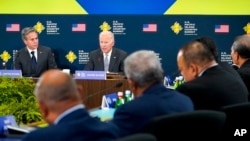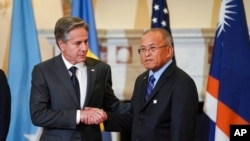Alarmed by China's success in wooing Pacific island nations, the Biden administration is proposing to spend billions to keep three of those countries in the U.S. orbit.
President Joe Biden's proposed federal budget released Thursday includes more than $7.1 billion in funding for the Marshall Islands, Micronesia and Palau. The money is included in the $63.1 billion request for the State Department and the U.S. Agency for International Development.
It's unclear if Congress would approve such aid. The overall budget proposal faces certain opposition in the Republican-led House and some GOP lawmakers are pushing for severe foreign aid cuts as they look to slash federal spending. But members of Congress have shown rare bipartisan unity on countering China, offering the prospect that the Pacific island aid could be seen more favorably.
The money, to be paid out over 20 years, would extend agreements with the three states. Under the agreements, the U.S. provides the three states with essential services and economic support in exchange for military basing rights and other preferential treatment.
The so-called Compacts of Free Association deals were set to expire later this year and next, and U.S. officials say China has been trying to exploit extension negotiations for its own advantage.
The White House said the payments are part of its strategy to "outcompete China" and strengthen America's alliances and partnerships in the Indo-Pacific. But apart from direct military programs they are the largest single budget line for the region in the spending plan.
The Defense Department's portion of the budget request, totaling $842 billion, prioritizes ramping up the U.S. military presence in the Indo-Pacific.
"China is the United States' only competitor with both the intent to reshape the international order and, increasingly, the economic, diplomatic, military and technological power to do it," the White House said.
"During these unprecedented and extraordinary times, the budget requests both discretionary and mandatory resources to outcompete China and advance American prosperity globally," it said.
If the funds are approved by Congress, Micronesia would receive $3.3 billion, the Marshall Islands $2.3 billion and Palau $890 million over the period of fiscal years 2024 to 2044. In addition, $634 million would be allocated to the U.S. Postal Service to continue to operate the three countries' mail.
Under the Compacts of Free Association that date to the 1960s, the U.S. provides the three countries with postal services and runs their weather forecasting, air traffic control and emergency management operations. In return, the U.S. gets basing rights for military, intelligence, telecommunications and space exploration facilities.
However, islanders have long complained that previous agreements did not adequately address their needs or long-term environmental and health issues caused by U.S. nuclear testing in the 1950s and '60s.
Over the past several years, China has sought to exploit divisions between the U.S. and the islands in a bid to expand its influence in the region, alarming both the Trump and Biden administrations, which have tried to blunt those efforts.
The current compacts with the Marshall Islands and Micronesia expire this year and the one with Palau expires in 2024. But, in January, the administration signed memorandums of understanding on their renewals with the Marshalls and Palau and a month later with Micronesia. All are contingent on congressional approval of the budget.





